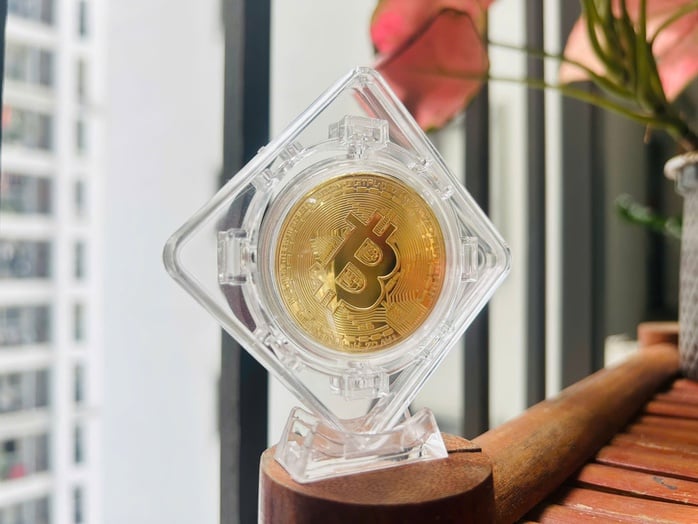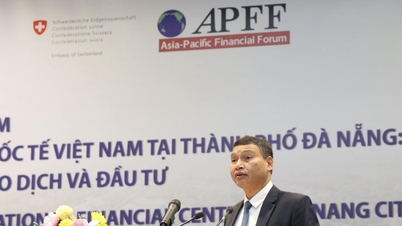Over the past decade, the digital asset market in Vietnam has developed at a dizzying pace but is mainly in a "gray zone", lacking a legal framework and management mechanism. According to TripleA's report (2024), Vietnam has about 17 million people owning crypto assets, equivalent to 17% of the population, ranking 5th globally.

Vietnam has about 17 million people owning digital assets, of which Bitcoin is very popular. Photo: Minh Chien
The above figures show huge demand and potential, but at the same time also expose a reality: hundreds of thousands of billions of dong in transactions each year take place out of control, easily exploited for money laundering, fraud, or tax loss.
From "gray zone" to legal corridor
On September 9, 2025, the Government issued Resolution 05/2025/NQ-CP, officially allowing a 5-year pilot of the crypto asset market. This is an important milestone, marking the transition from a "gray zone" to a recognized legal corridor.
With this resolution, Vietnam not only creates a management and supervision mechanism, but also opens up opportunities to attract international investment capital, encourage innovation, and especially retain the capital flow of more than 100 billion USD each year that is flowing to foreign markets or "illegally" traded domestically.

Associate Professor, Dr. Ngo Tri Long
Resolution 05 allows businesses to issue digital assets based on real assets (except for securities and fiat money). This creates additional capital mobilization tools besides stocks, bonds, or bank credit. In the context of limited traditional capital markets, this new channel can help many businesses, especially in the fields of technology, real estate, and renewable energy, easily access domestic and foreign investors.
According to the Vietnam Blockchain and Digital Assets Association (VBA), if well managed, the digital asset market can help businesses reduce their dependence on bank loans, while making capital mobilization activities transparent and limiting underground investment.
Vietnam has become a bright spot for investment attraction when many countries are still hesitant. Vietnam's pioneering issuance of a legal framework has created a big buzz. Within just a few months after the resolution, MBBank signed a cooperation agreement with Dunamu (Korea) - the operator of the Upbit exchange, one of the world's leading crypto exchanges. In addition, VPBank, Techcombank, and SSI are also preparing to join this market.
These moves suggest that Vietnam could become a new hub for fintech, blockchain, and Web3 capital flows in the region, similar to what Singapore and Dubai have done before.
Promoting the digital asset innovation ecosystem is not limited to cryptocurrencies like Bitcoin or Ethereum. The pilot opens up a series of new applications: real estate tokenization, carbon credits, safe custody services, peer-to-peer lending (P2P lending), DeFi (decentralized finance), or digital copyright management. These are important pieces to realize the goal of a digital economy accounting for 30% of GDP by 2030.
Not a small challenge
The resolution requires businesses wishing to set up a digital asset trading floor to have a minimum charter capital of VND10,000 billion, of which at least 65% comes from domestic organizations and 35% comes from financial institutions such as banks, securities, and insurance. This regulation ensures safety, avoiding the situation of "underground" floors or small retail floors that are prone to collapse, but also poses a barrier to startups, the force that is the strongest engine of innovation.
Another issue is the risk of fraud and lack of knowledge. According to the FBI Internet Crime Complaint Center (2024), the total loss from global crypto-related fraud reached 9.3 billion USD, an increase of 66% compared to 2023. Vietnam is among the 6 countries with the most fraud cases, with more than 2,600 fraudulent transactions recorded. The biggest weakness of individual investors is the "get rich quick" mentality, lack of verification knowledge, being easily lured by KOLs, online communities, or advertisements promising unrealistic profits.
The problem of human resources and cybersecurity is that there is a serious shortage of high-quality human resources in the fields of blockchain, cybersecurity and digital asset management in Vietnam. Mr. Phan Duc Trung, Chairman of VBA, said: "We need thousands of technical, administrative and legal experts, but currently the number of trained people is less than one-tenth of the demand."
In addition, the risk of cyber attacks, exchange hacks, or loss of information security remains a major concern. Deputy Governor of the State Bank Pham Tien Dung emphasized: "Without information security, there can be no trust, and without trust, there will be no market."
Three pillars for sustainable market operation
For the digital asset market to truly develop healthily, Vietnam needs to focus on three main pillars. First, perfect the legal framework and tax policies for digital assets, clearly distinguishing between transfer tax, personal income tax, and corporate tax. Establish a mechanism to monitor cash flow, prevent money laundering and terrorist financing. Regularly update to adapt to the speed of technological innovation.
Second, improve the capacity of domestic financial institutions: domestic banks, securities companies, and investment funds must invest heavily in technology and learn from international models to be competitive. Form alliances between banks, fintech, and blockchain businesses to create a combined strength. The State can consider establishing a National Digital Asset Depository Center, which plays a core infrastructure role.
Third, educate and protect investors. Disseminate knowledge about blockchain and digital assets to the community, especially young people, the largest group of participants. Establish a compensation or insurance mechanism when the exchange has problems, similar to deposit insurance in banks. Strengthen strict handling of fraudulent acts and false advertising.
In short, Vietnam is facing a great opportunity to retain capital flows of more than 100 billion USD per year and exploit the potential for innovation from digital assets. However, the opportunity can only be realized if we build a flexible legal framework, develop strong enough financial institutions, and most importantly, protect investor confidence.
If done well, Vietnam can not only escape the "gray zone" but also become the leading digital asset center in the region, making an important contribution to the goal of a digital economy accounting for 30% of GDP by 2030. On the contrary, if management is delayed or lax, the risk of fraud, loss and loss of trust will cause this young market to collapse, leading to many economic and social consequences.
In the digital age, good management of digital assets is the key for Vietnam to retain capital, attract investment, and make a strong breakthrough on the global financial and technology map.
Source: https://nld.com.vn/co-hoi-giu-lai-100-ti-usd-tien-so-nhu-bitcoin-ethereum-cho-viet-nam-196250921095643755.htm



![[Photo] Da Nang: Hundreds of people join hands to clean up a vital tourist route after storm No. 13](https://vphoto.vietnam.vn/thumb/1200x675/vietnam/resource/IMAGE/2025/11/07/1762491638903_image-3-1353-jpg.webp)









































































































Comment (0)